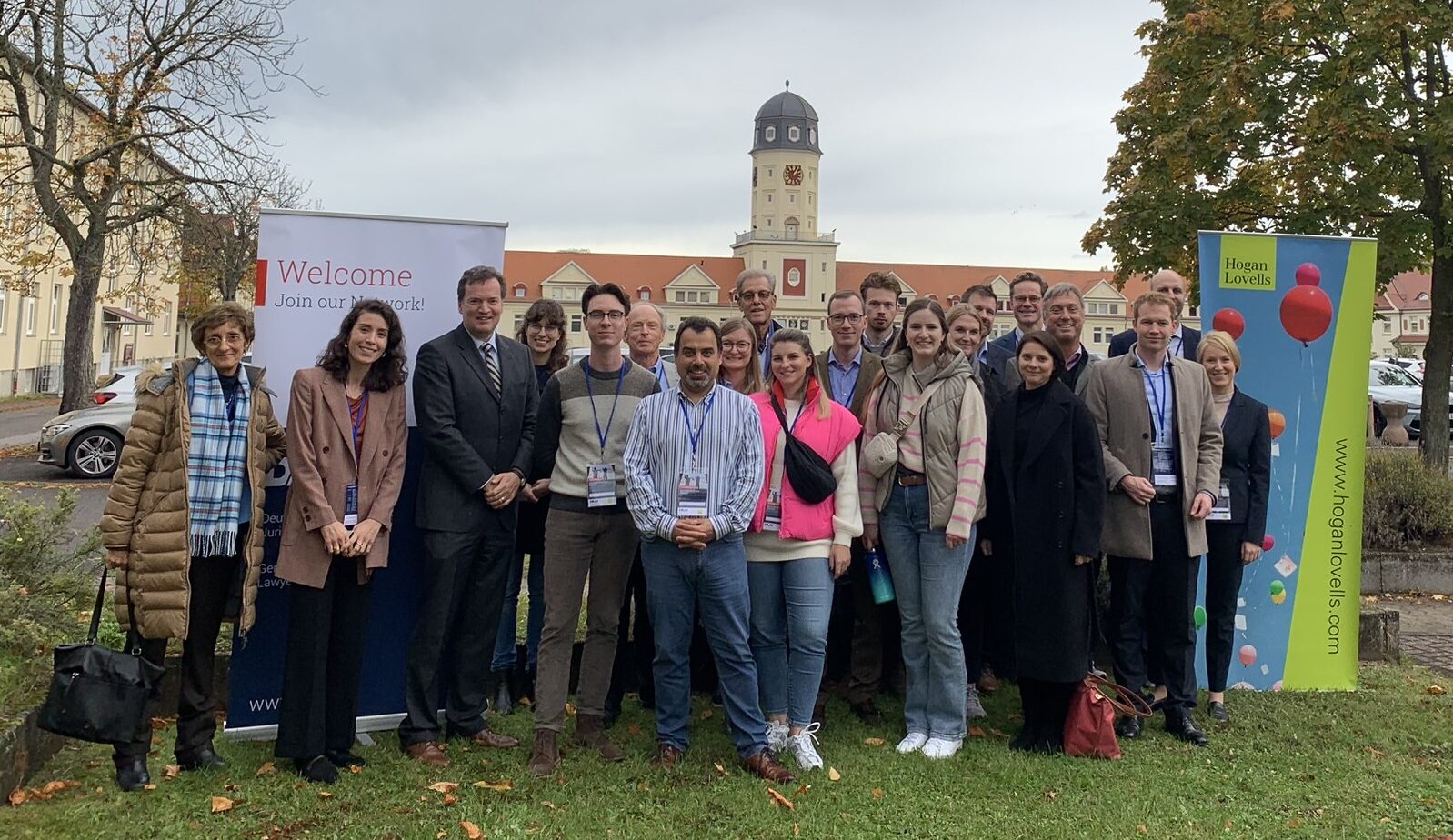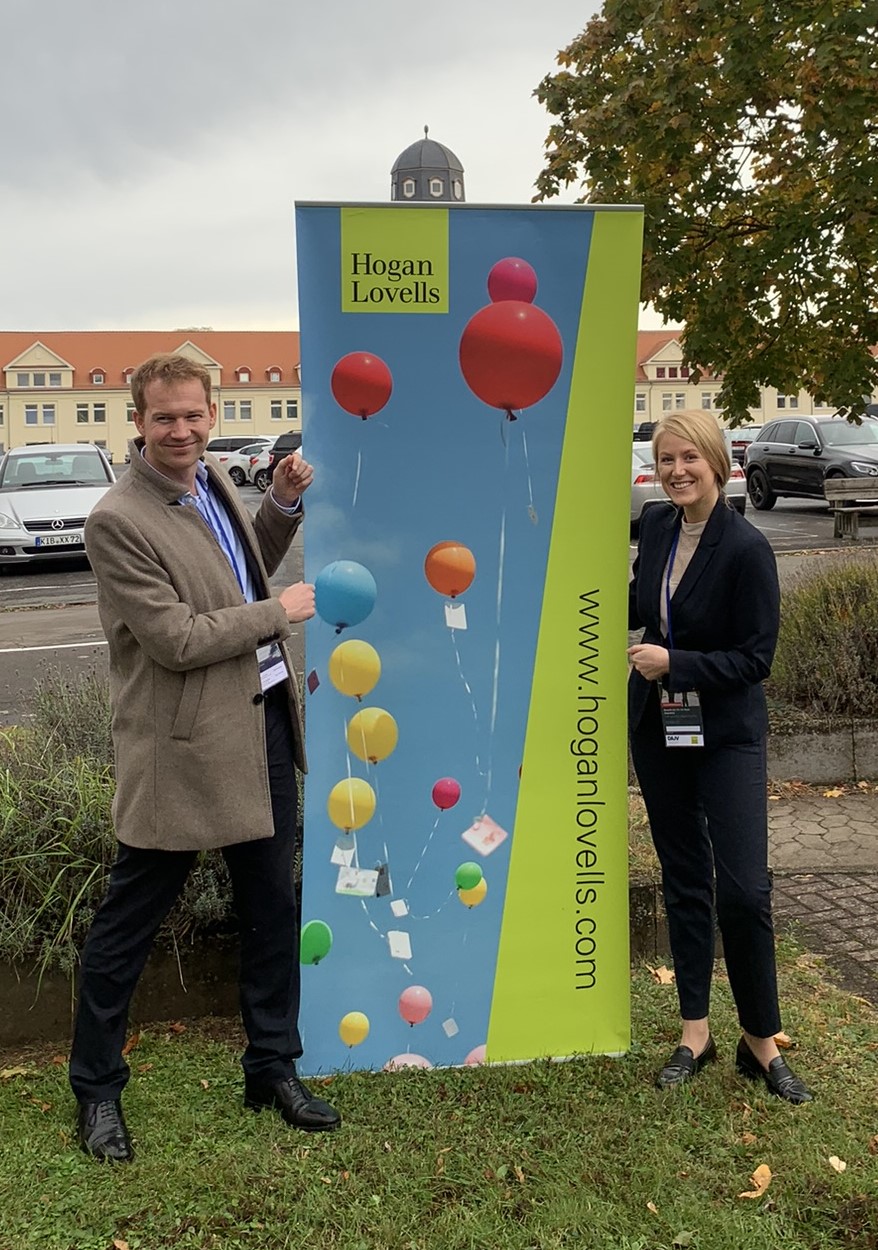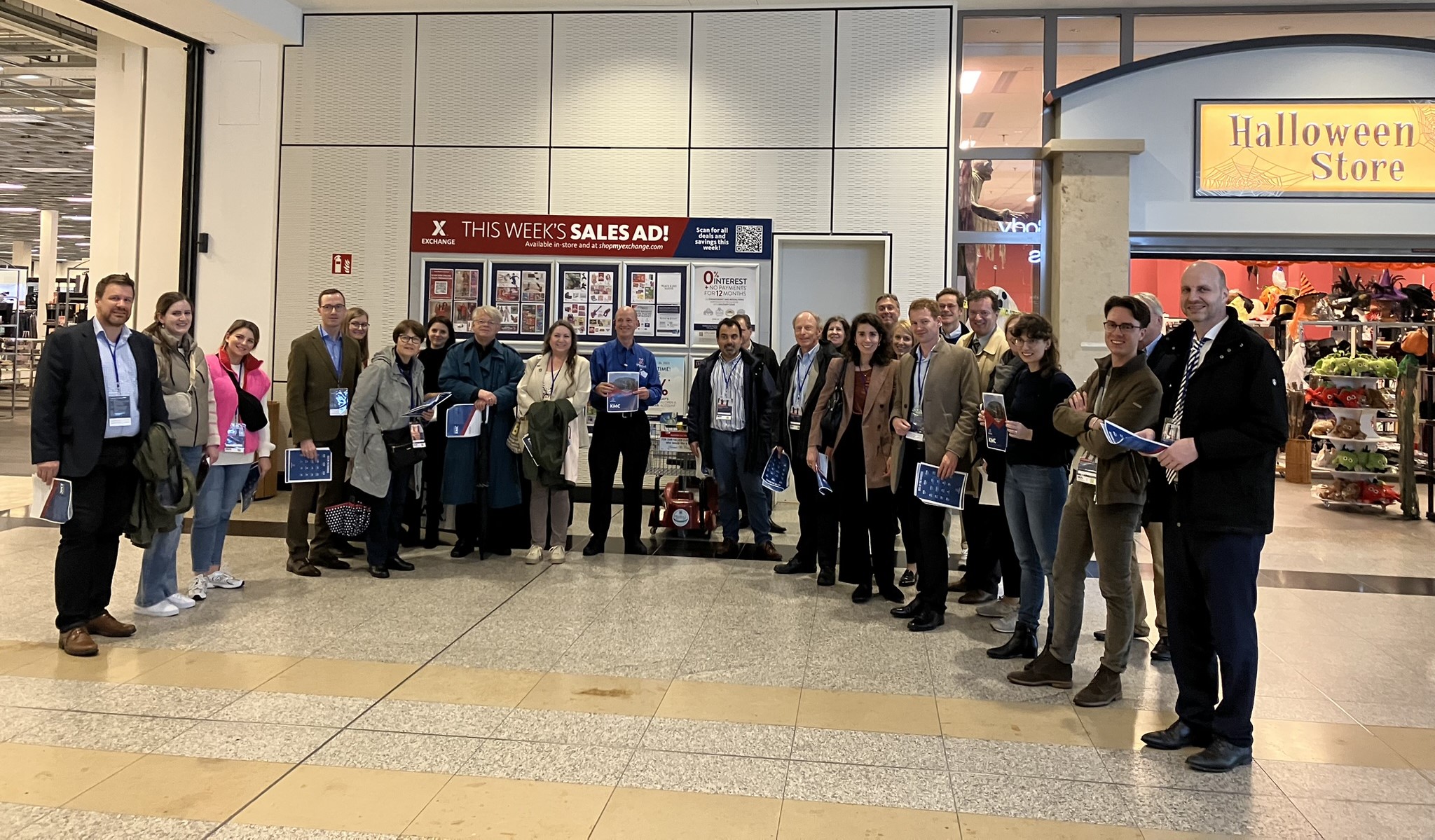By Caroline Jesche
It’s that time again: On Thursday, October 19, 2023, DAJV members had the exhilarating chance to explore different facilities within the Kaiserslautern Military Community (KMC). We acquired valuable insights into the U.S. Military presence in Germany, spanning from the U.S. Army Garrison Rheinland-Pfalz headquarters in Kaiserslautern to the U.S. Air Force base in Ramstein.
Our “American” day started at 9 a.m. at the main station in Kaiserslautern, where a shuttle service sponsored by Hogan Lovells transported us to our first destination, the Kleber Barracks.
At the commencement of the event, Isabel Cagala, head of DAJV Young Professionals, and Joerg C. Moddelmog, LL.M. (USA), Senior German Attorney-Advisor of the 21st Theater Sustainment Command (TSC), extended a warm welcome to us before the speakers from the US Army took the floor.

Overview of U.S. Forces in Europe & Legal Basis
Following introductory remarks from COL Katherine S. Gowl, Staff Judge Advocate of the 21st TSC, MAJ Jeffrey D. Kyle introduced us to the history and basic structure of the U.S. army. We received a concise overview of the global deployment of NATO troops, with a specific emphasis on the legal foundations for their presence on German soil, encompassing agreements such as the Convention on the Presence of Foreign Forces, the NATO Status of Forces Agreement (SOFA), and the associated German Supplementary Agreement (German SA). MAJ Kyle then characterized the 21st TSC and its military attorneys as “the world’s largest law firm.” He seamlessly transitioned the presentation to 1LT Taylor Swift (not to be confused with the famous pop star) and 1LT Victoria Jones, two emerging attorneys commencing their journey in military service. In addition to offering insights into their individual career journeys, they also elaborated on various practice areas and groups, encompassing legal assistance in family law and financial matters to national security law; from contract to fiscal law; from trial defense counsels to special victims counsels – essentially, covering a broad spectrum of legal fields within the army.
U.S. military justice
Following a brief intermission filled with conversations, coffee, and American candy, LTC W. Jeremy Stephens resumed with an overview of the U.S. Army’s military criminal jurisdiction. Although discipline is considered the soul of the army, as he outlined, it is inevitable that military personnel may transgress rules. Unlike Germany, the United States has established a comprehensive military jurisdiction based on the Uniform Code of Military Justice (UCMJ, 10 U.S. Code Chapter 47). There are three different penalty sentences: Administrative Actions (e.g., on-the-spot corrections, extra training), Nonjudicial Punishments, and Judicial Punishments. In the event of anticipated Judicial Punishments, the Kleber Barracks boast their own courtroom, which we had the opportunity to visit. The trial follows the adversarial trial model. The accused can opt to be judged either by a single judge or by a jury (the panel). All parties involved in the trial are military personnel, including the defense counsel, provided to the defendant free of charge in all proceedings.


Claims Against the U.S. in Europe
Next, Colonel (Retired) Peter Masterton, Chief International Law of the 21st TSC, presented the tort liability system of the U.S. Forces in Germany. He initiated the session by providing an overview of various types of tort claims and claim acts such as the NATO Status of Forces Agreement (NATO SOFA), the Military Claims Act (MCA), and the Foreign Claims Act (FCA) before elucidating the rights under Article 139 UCMJ. Thus, Article 139 UCMJ applies to loss or damage to “real or personal property that has been willfully damaged or wrongfully taken” by a military member. Willful damage includes “damage caused intentionally without justification” and damage from “riotous, violent, or disorderly acts, acts of depredation or acts showing a reckless and wanton disregard for the property rights of others.” It does not apply, for example, to claims arising from negligent acts, personal injury, death, or theft of services. It also excludes claims stemming from acts or omissions of military personnel acting within the scope of their employment. Colonel Masterton then concluded with insights into recent claims issues before we had lunch in the barracks’ canteen.

Persons with NATO Status
Last but not least, Joerg C. Moddelmog gave us interesting insights into the handling of persons with NATO status in German court proceedings. Starting with the scope of NATO SOFA, it is important to note that, according to Art. 1, not only members of the Armed Forces but also the so-called civilian component (US civilian employees) and their dependents (family members) are included. Additionally, specific procedural requirements must be fulfilled in legal proceedings involving individuals with NATO status, such as service of process and enforcement. Joerg C. Moddelmog concluded by providing us with insights into the salary and pension frameworks for members of the US Army.
Global gateway to Europe and beyond – Ramstein Air Base
Following this captivating blend of factual insights and personal anecdotes that seemed to make time fly, we proceeded to the next item on the agenda: the Ramstein Air Base. A 20 minutes bus ride with the DAJV shuttlebus took us to the well-guarded entrance. After having our identity checked by an armed patrol, we entered the grounds—a setting reminiscent of an American small town straight out of a storybook. Passing through various dormitories for the Air(wo)men and their families, numerous leisure facilities including bars and officer clubs, fitness studios, a vast golf course, and chapels, we gathered intriguing information about the entire base. The base was established in 1951 and functions as the headquarters of the U.S. Air Forces in Europe. It also accommodates the 86th Airlift Wing, responsible for airlifting and supporting troops and materiel. Ramstein Air Base plays a crucial role in aiding U.S. military operations in Europe, the Middle East, and Africa. Serving as a hub for air transport of personnel and cargo, it is also a communications and logistics center. In addition to military facilities, the base offers all the necessities of a small town, including a complete U.S. school system, medical facilities, several fire stations, and its water source.

KMCC Complex – the Be(a)st
Due to the current tense global situation regarding international conflicts, the DAJV, unfortunately but understandably, was unable to visit the interior of an aircraft this time. Nonetheless, what’s essential during a stay in America? Indeed, exploring a genuine American mall is a must. We were directed to the expansive KMCC Complex, a cornerstone project designed to enhance the quality of life for residents at Ramstein. Built in 2004 and officially opened in 2009, the KMCC provides a comprehensive consumer experience all under one roof, spanning 78,000 square meters: A nine-counter food court, 38 permanent and 15+ roving concessionaires, a four-plex movie theater that can accommodate up to 500 moviegoers, a 350-bed hotel, Travel Office, and outdoor recreation. The 40,000 sq. meters main store complex features an American style mall layout with European flair. 4,000 customers come daily to experience the American way of life.

With numerous impressions and acquired knowledge, we eventually returned to the bus, concluding our unforgettable Ramstein excursion in Kaiserslautern in the early evening. To sum up: As in previous years, we had a fantastic time and returned home with many new insights.
We extend our sincere thanks to the U.S. Armed Forces and eagerly anticipate being their guests again!
The Author:
Caroline Jesche is a law clerk at the Higher Regional Court in Frankfurt a.M. and is currently working at Hogan Lovells in Brussels.
Responsible Editor:
Isabel Cagala, TLB Co-Editor-in-Chief